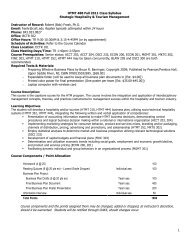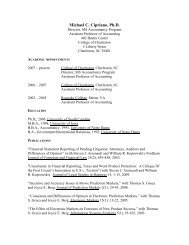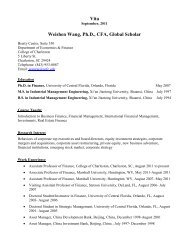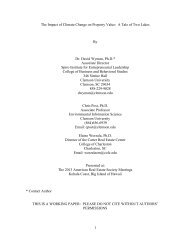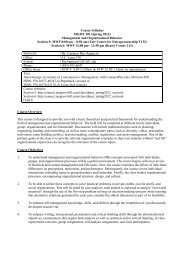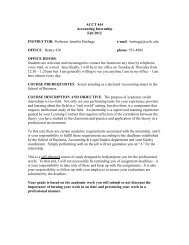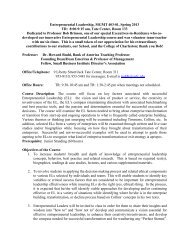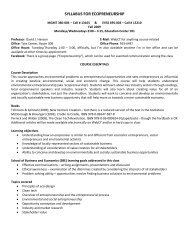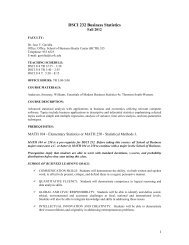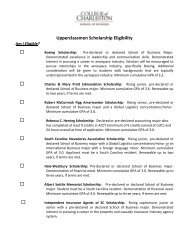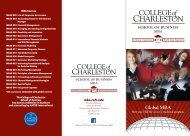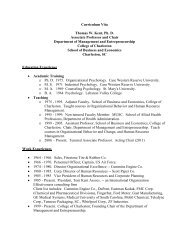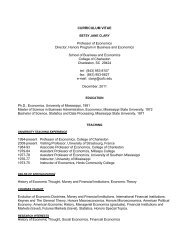HTMT 361 Dr. Wayne Smith - School of Business - College of ...
HTMT 361 Dr. Wayne Smith - School of Business - College of ...
HTMT 361 Dr. Wayne Smith - School of Business - College of ...
You also want an ePaper? Increase the reach of your titles
YUMPU automatically turns print PDFs into web optimized ePapers that Google loves.
<strong>College</strong> <strong>of</strong> Charleston Honor Code and Academic Integrity<br />
Lying, cheating, attempted cheating, and plagiarism are violations <strong>of</strong> our Honor Code that, when<br />
identified, are investigated. Each incident will be examined to determine the degree <strong>of</strong> deception<br />
involved.<br />
Incidents where the instructor determines the student’s actions are clearly related more to a<br />
misunderstanding will handled by the instructor. A written intervention designed to help prevent<br />
the student from repeating the error will be given to the student. The intervention, submitted by<br />
form and signed by both the instructor and the student, will be forwarded to the Dean <strong>of</strong> Students<br />
and placed in the student’s file.<br />
Cases <strong>of</strong> suspected academic dishonesty will be reported directly by the instructor and/or others<br />
having knowledge <strong>of</strong> the incident to the Dean <strong>of</strong> Students. A student found responsible by the<br />
Honor Board for academic dishonesty will receive a XF in the course, indicating failure <strong>of</strong> the<br />
course due to academic dishonesty. This grade will appear on the student’s transcript for two<br />
years after which the student may petition for the X to be expunged. The student may also be<br />
placed on disciplinary probation, suspended (temporary removal) or expelled (permanent<br />
removal) from the <strong>College</strong> by the Honor Board.<br />
Students should be aware that unauthorized collaboration--working together without permission--<br />
is a form <strong>of</strong> cheating. Unless the instructor specifies that students can work together on an<br />
assignment, quiz and/or test, no collaboration during the completion <strong>of</strong> the assignment is<br />
permitted. Other forms <strong>of</strong> cheating include possessing or using an unauthorized study aid (which<br />
could include accessing information stored on a cell phone), copying from others’ exams,<br />
fabricating data, and giving unauthorized assistance.<br />
Research conducted and/or papers written for other classes cannot be used in whole or in part for<br />
any assignment in this class without obtaining prior permission from the instructor.<br />
Students can find the complete Honor Code and all related processes in the Student Handbook at<br />
http://www.c<strong>of</strong>c.edu/studentaffairs/general_info/studenthandbook.html.<br />
Disability Statement<br />
This <strong>College</strong> abides by section 504 <strong>of</strong> the Rehabilitation Act <strong>of</strong> 1973 and the Americans with<br />
Disabilities Act that stipulates no student shall be denied access to an education “solely by reason<br />
<strong>of</strong> a handicap.” Disabilities covered by law include, but are not limited to, learning disabilities<br />
and hearing, sight or mobility impairments. If you have a documented disability that may have<br />
some impact on your work in this class and for which you may require accommodations, please<br />
see an administrator at the Center <strong>of</strong> Disability Services, (843) 953-1431 or me so that such<br />
accommodation may be arranged.




